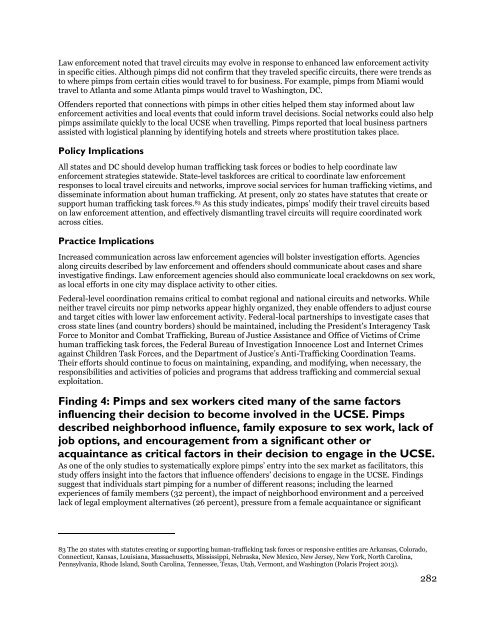413047-Underground-Commercial-Sex-Economy
413047-Underground-Commercial-Sex-Economy
413047-Underground-Commercial-Sex-Economy
You also want an ePaper? Increase the reach of your titles
YUMPU automatically turns print PDFs into web optimized ePapers that Google loves.
Law enforcement noted that travel circuits may evolve in response to enhanced law enforcement activity<br />
in specific cities. Although pimps did not confirm that they traveled specific circuits, there were trends as<br />
to where pimps from certain cities would travel to for business. For example, pimps from Miami would<br />
travel to Atlanta and some Atlanta pimps would travel to Washington, DC.<br />
Offenders reported that connections with pimps in other cities helped them stay informed about law<br />
enforcement activities and local events that could inform travel decisions. Social networks could also help<br />
pimps assimilate quickly to the local UCSE when travelling. Pimps reported that local business partners<br />
assisted with logistical planning by identifying hotels and streets where prostitution takes place.<br />
Policy Implications<br />
All states and DC should develop human trafficking task forces or bodies to help coordinate law<br />
enforcement strategies statewide. State-level taskforces are critical to coordinate law enforcement<br />
responses to local travel circuits and networks, improve social services for human trafficking victims, and<br />
disseminate information about human trafficking. At present, only 20 states have statutes that create or<br />
support human trafficking task forces. 83 As this study indicates, pimps’ modify their travel circuits based<br />
on law enforcement attention, and effectively dismantling travel circuits will require coordinated work<br />
across cities.<br />
Practice Implications<br />
Increased communication across law enforcement agencies will bolster investigation efforts. Agencies<br />
along circuits described by law enforcement and offenders should communicate about cases and share<br />
investigative findings. Law enforcement agencies should also communicate local crackdowns on sex work,<br />
as local efforts in one city may displace activity to other cities.<br />
Federal-level coordination remains critical to combat regional and national circuits and networks. While<br />
neither travel circuits nor pimp networks appear highly organized, they enable offenders to adjust course<br />
and target cities with lower law enforcement activity. Federal-local partnerships to investigate cases that<br />
cross state lines (and country borders) should be maintained, including the President’s Interagency Task<br />
Force to Monitor and Combat Trafficking, Bureau of Justice Assistance and Office of Victims of Crime<br />
human trafficking task forces, the Federal Bureau of Investigation Innocence Lost and Internet Crimes<br />
against Children Task Forces, and the Department of Justice’s Anti-Trafficking Coordination Teams.<br />
Their efforts should continue to focus on maintaining, expanding, and modifying, when necessary, the<br />
responsibilities and activities of policies and programs that address trafficking and commercial sexual<br />
exploitation.<br />
Finding 4: Pimps and sex workers cited many of the same factors<br />
influencing their decision to become involved in the UCSE. Pimps<br />
described neighborhood influence, family exposure to sex work, lack of<br />
job options, and encouragement from a significant other or<br />
acquaintance as critical factors in their decision to engage in the UCSE.<br />
As one of the only studies to systematically explore pimps’ entry into the sex market as facilitators, this<br />
study offers insight into the factors that influence offenders’ decisions to engage in the UCSE. Findings<br />
suggest that individuals start pimping for a number of different reasons; including the learned<br />
experiences of family members (32 percent), the impact of neighborhood environment and a perceived<br />
lack of legal employment alternatives (26 percent), pressure from a female acquaintance or significant<br />
83 The 20 states with statutes creating or supporting human-trafficking task forces or responsive entities are Arkansas, Colorado,<br />
Connecticut, Kansas, Louisiana, Massachusetts, Mississippi, Nebraska, New Mexico, New Jersey, New York, North Carolina,<br />
Pennsylvania, Rhode Island, South Carolina, Tennessee, Texas, Utah, Vermont, and Washington (Polaris Project 2013).<br />
282


